California Criminal Background Check 7-Year Rule: What You Need to Know
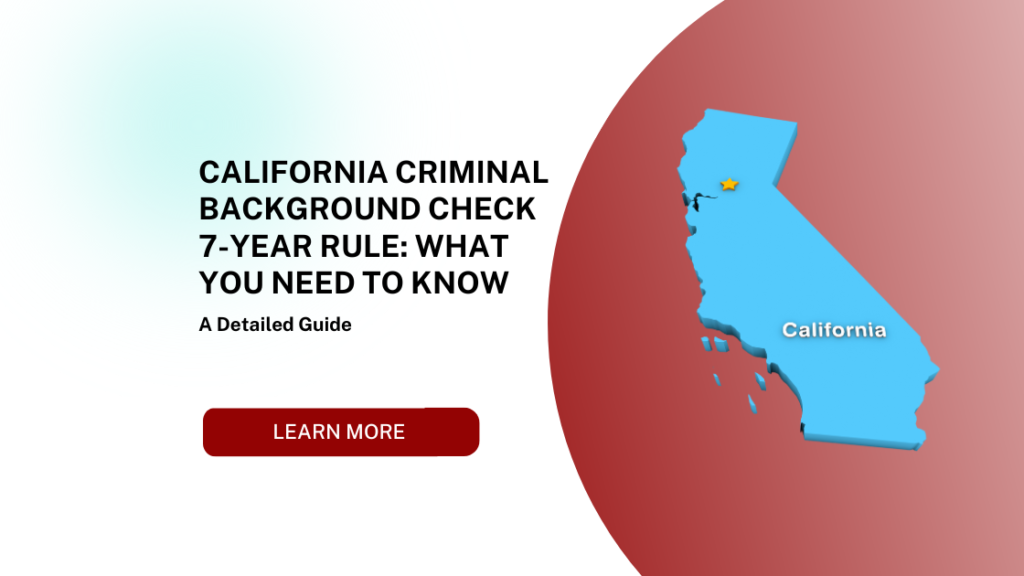
Understanding the California Criminal Background Check 7-Year Rule
The California criminal background check 7-year rule refers to a specific provision that limits the amount of criminal history information that can be disclosed during background checks for certain purposes. Under this rule, criminal records—whether misdemeanor or felony convictions—are generally not reported if they occurred more than 7 years ago. This law is primarily designed to help individuals with a criminal past, ensuring that older offenses do not unfairly hinder opportunities such as employment, housing, and credit applications.
The Significance of the 7-Year Rule in California
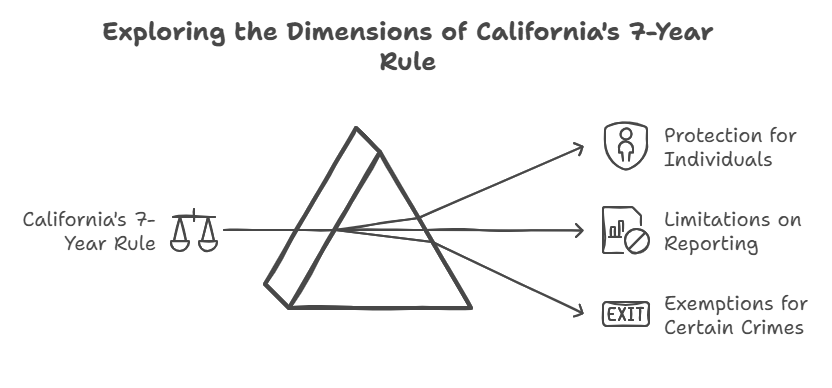
The 7-year rule is an important part of the landscape in California criminal background checks. For job seekers, tenants, and others undergoing background checks, the rule serves as a safeguard against past mistakes that are no longer relevant or significant to the individual’s current life. Employers, landlords, and other entities are prohibited from considering criminal convictions that occurred more than seven years ago when making decisions about hiring, renting, or providing services. This ensures that people are not unjustly penalized for past actions, especially if they have shown a track record of good behavior and rehabilitation in the years since.
While the 7-year rule limits what can be reported, it is important to note that certain information, such as arrests that did not lead to a conviction, may still be reported. Moreover, some criminal offenses, like those involving minors or violent crimes, may be exempt from the 7-year reporting limitation.
When and Why Does the 7-Year Rule Apply?
In California, the 7-year rule applies primarily to background checks related to employment, housing, and financial transactions. These checks are used to evaluate the trustworthiness and reliability of an individual. Here’s when the rule is applicable:
- Employment: Employers are prohibited from asking about or considering convictions older than 7 years, especially when making decisions about hiring. This rule helps level the playing field for job seekers who have made mistakes in the past but have since rehabilitated.
- Housing: Landlords cannot consider criminal convictions older than 7 years when deciding whether to rent a property to someone, except in specific cases related to violent crimes or sex offenses.
- Loans and Credit: Financial institutions also follow the 7-year rule to prevent discrimination based on old criminal convictions when evaluating individuals for loans or credit.
Comparison of Criminal Background Check Rules: California vs. Other States
The 7-year rule in California is more restrictive compared to some other states. Below is a comparison highlighting how California’s approach stands out:
| State | Criminal Background Check Disclosure Limit | Applies To |
|---|---|---|
| California | 7 years | Employment, Housing, Credit |
| New York | 7 years (applies to employment only) | Employment, housing (varies by city) |
| Texas | No limit, but some restrictions apply | Employment, Housing |
| Florida | No time limit for most checks | Employment, Housing, Credit |
| Illinois | 7 years | Employment, Housing, Credit |
Types of Convictions Covered Under the 7-Year Rule
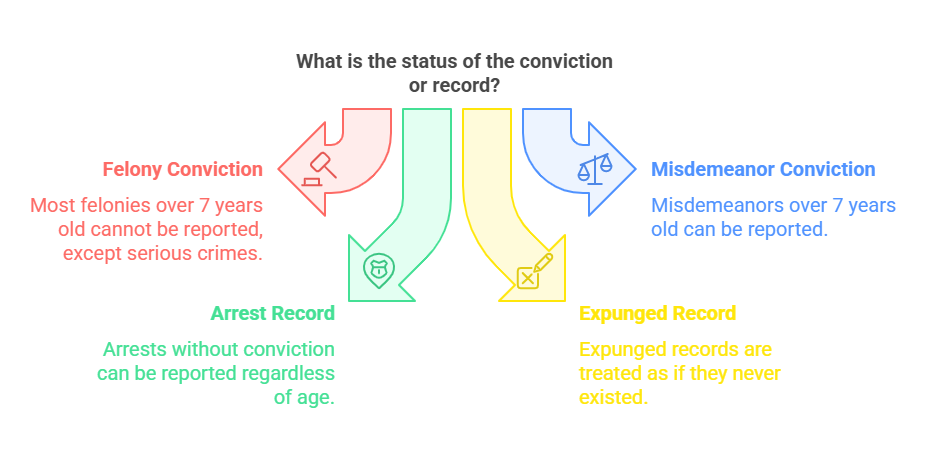
The 7-year rule applies to both felonies and misdemeanors. However, it is essential to understand that:
- Felonies: Most felony convictions that occurred more than 7 years ago cannot be reported. However, exceptions exist for certain serious crimes.
- Misdemeanors: Misdemeanors are also covered under the 7-year rule, provided the conviction occurred more than 7 years ago.
- Arrests: Arrest records that do not lead to a conviction are not subject to the 7-year rule and can be reported, regardless of how old the arrest is.
- Expunged Records: If a criminal record is expunged, it is as if the record never existed, and it cannot be reported during a background check.
Implications of the 7-Year Rule for Job Seekers and Housing Applicants
For job seekers, the 7-year rule can have a profound impact, especially for those with convictions in their past. If the crime is over 7 years old, it cannot be considered in the hiring decision, which can give individuals a fresh chance in the job market.
For housing applicants, the 7-year rule can significantly affect their ability to rent. Landlords are prohibited from considering criminal convictions older than 7 years, which helps applicants with a criminal history have better access to housing opportunities. However, certain criminal offenses (such as violent crimes or sex offenses) may still be considered even if they are older than 7 years.
In both cases, the 7-year rule helps prevent discrimination based on outdated information, providing opportunities for people who have demonstrated positive changes in their lives.
The California Criminal Background Check Process
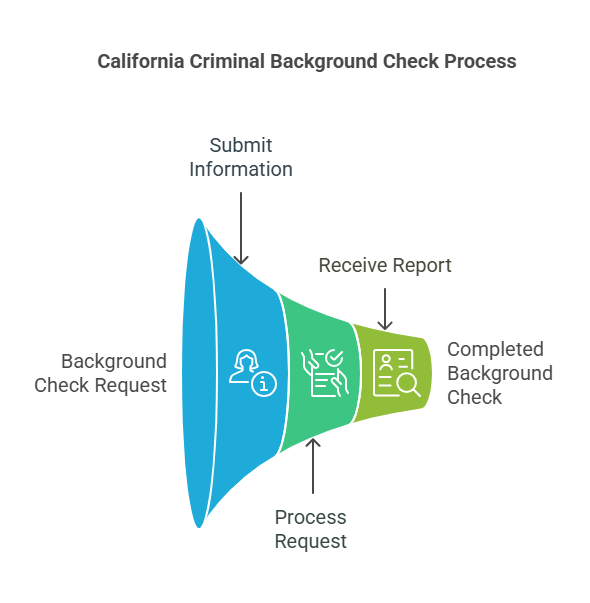
In California, criminal background checks are typically conducted by requesting an individual’s record from official databases such as the California Department of Justice (DOJ) or local law enforcement agencies. The process generally involves the following steps:
- Requesting the Background Check: Employers, landlords, or individuals can request a criminal background check by submitting a request to the DOJ or through a third-party service.
- Submitting the Required Information: To conduct a background check, individuals typically need to provide personal information, including name, date of birth, and sometimes fingerprints.
- Processing the Request: The DOJ or local law enforcement agencies will process the request, which can take anywhere from a few days to several weeks depending on the request’s complexity.
- Receiving the Report: Once processed, the criminal background check will include all relevant criminal history, including convictions, arrests, and other relevant records.
How the 7-Year Rule Affects the Background Check Process
The 7-year rule influences the criminal background check process by limiting the scope of what can be disclosed. After 7 years, certain convictions (both felonies and misdemeanors) are excluded from the report, meaning employers and landlords will not have access to that information. This can impact hiring decisions and housing applications in a positive way for those with older criminal records.
However, there are exceptions to the rule:
- Exemptions for Certain Job Roles: Certain industries, such as law enforcement or positions working with vulnerable populations, may not be bound by the 7-year rule.
- Out-of-State Convictions: The 7-year rule applies to California records, but for out-of-state convictions, the reporting time may differ depending on the state of origin.
How the 7-Year Rule Impacts Employment Opportunities
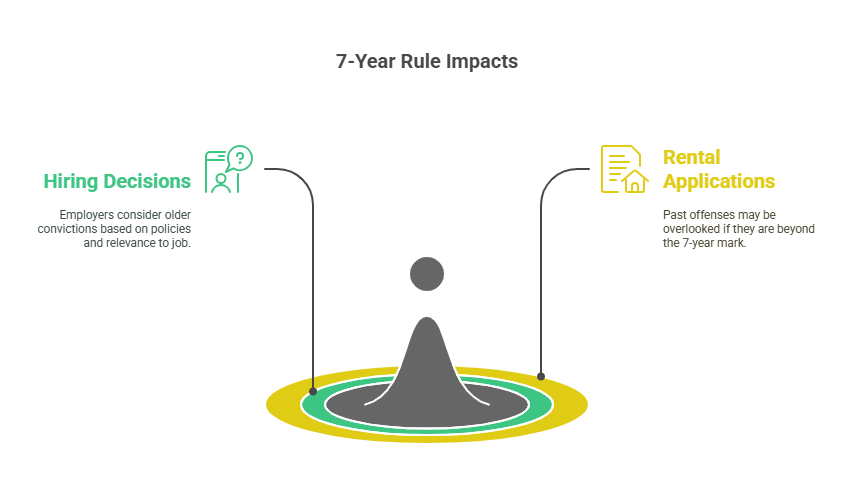
The 7-year rule is beneficial for job seekers with older criminal convictions as it ensures that offenses that occurred more than 7 years ago are not considered by employers. However, employers can still ask about criminal convictions that are relevant to the position, even if they occurred more than 7 years ago, in cases where the conviction is directly related to the job responsibilities.
For example, a person convicted of fraud may have that record considered in a finance-related job application, even if the conviction is older than 7 years, because the offense directly relates to the nature of the position.
Examples of Real-World Impact
- Hiring: A person with a felony conviction for theft that occurred 8 years ago may still be considered for a job at a retail store under the 7-year rule, depending on the employer’s policy on hiring individuals with criminal records.
- Rental Applications: A person who was convicted of a drug offense 10 years ago may not have that conviction considered in a rental application due to the 7-year rule, providing they have since maintained a clean record.
For businesses and individuals seeking to ensure compliance with the 7-year rule, working with a service like exactbackgroundchecks.com can help facilitate accurate and timely background checks while adhering to state and federal regulations.
Legal Aspects of the 7-Year Rule in California
The 7-year rule in California is largely governed by state law and influenced by federal regulations, including the Fair Credit Reporting Act (FCRA). The FCRA mandates that consumer reporting agencies (CRAs) do not report criminal convictions older than seven years unless they are relevant to a hiring decision or other types of consumer evaluations. California law enhances this by providing additional protections against discrimination based on older convictions and limiting the reporting of certain types of records.
Additionally, California has passed several laws like the Ban the Box law, which further protect applicants from being discriminated against based on their criminal history.
FAQs About the California Criminal Background Check 7-Year Rule
Does the 7-year rule apply to all types of background checks in California?
Yes, the 7-year rule applies to most background checks conducted for employment, housing, and credit purposes. However, certain jobs (e.g., law enforcement) may have exceptions.
Can a background check show convictions older than 7 years if they are still relevant to the job?
Yes, certain convictions may still be disclosed if they are highly relevant to the job, such as a financial crime for a finance-related position.
Are there any exceptions to the 7-year rule for certain industries?
Yes, industries such as law enforcement or jobs involving vulnerable populations may have exceptions and can report older convictions.
How does the 7-year rule impact background checks for housing applications in California?
Landlords cannot consider criminal convictions older than 7 years, except in specific circumstances related to certain violent crimes.
What happens if a criminal record is expunged after 7 years in California?
If a criminal record is expunged, it is effectively removed from the individual’s record and cannot be disclosed in background checks.
Conclusion
The California criminal background check 7-year rule plays a vital role in ensuring fairness and preventing discrimination based on past offenses. By limiting the scope of older criminal convictions, this rule offers individuals a second chance while still allowing employers, landlords, and financial institutions to make informed decisions. Whether you’re a job seeker, tenant, or business owner, understanding the 7-year rule is essential for navigating the criminal background check process in California.
For those looking to stay compliant with these regulations and obtain accurate criminal background checks, services like exactbackgroundchecks offer reliable and timely reports, ensuring adherence to both state and federal laws.



